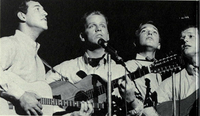The Brothers Four
| The Brothers Four | |
|---|---|

Brothers Four at University of Michigan
|
|
| Background information | |
| Origin | Seattle, Washington, United States |
| Genres | Folk, pop |
| Years active | 1957–present |
| Labels |
Columbia (U.S.) Philips (UK) Various others |
| Website | Official website |
| Members | Bob Flick Mike McCoy Mark Pearson Karl Olsen |
| Past members | Mike Kirkland Dick Foley Bob Haworth Tom Coe John Paine Terry Lauber |
The Brothers Four is an American folk singing group, founded in 1957 in Seattle, Washington, known for their 1960 hit song "Greenfields".
Bob Flick, John Paine, Mike Kirkland, and Dick Foley met at the University of Washington, where they were members of the Phi Gamma Delta fraternity in 1956 (hence the "Brothers" appellation). Their first professional performances were the result of a prank played on them in 1958 by a rival fraternity, who had arranged for someone to call them, pretend to be from Seattle's Colony Club, and invite them to come down to audition for a gig. Even though they were not expected at the club, they were allowed to sing a few songs, and were subsequently hired. Flick recalls them being paid "mostly in beer."
They left for San Francisco in 1959, where they met Mort Lewis, Dave Brubeck's manager. Lewis became their manager and later that year secured them a contract with Columbia Records. Their second single, "Greenfields," released in January 1960, hit #2 on the pop charts, sold over one million copies, and was awarded a gold disc by the RIAA. Their first album, Brothers Four, released toward the end of the year, made the top 20. Other highlights of their early career included singing their fourth single, "The Green Leaves of Summer," from the John Wayne movie The Alamo, at the 1961 Academy Awards, and having their third album, BMOC/Best Music On/Off Campus, go top 10. They also recorded the title song for the Hollywood film Five Weeks in a Balloon in 1962 and the theme song for the ABC television series Hootenanny, "Hootenanny Saturday Night," in 1963. They also gave a try at "Sloop John B", released as "The John B Sails".
...
Wikipedia
